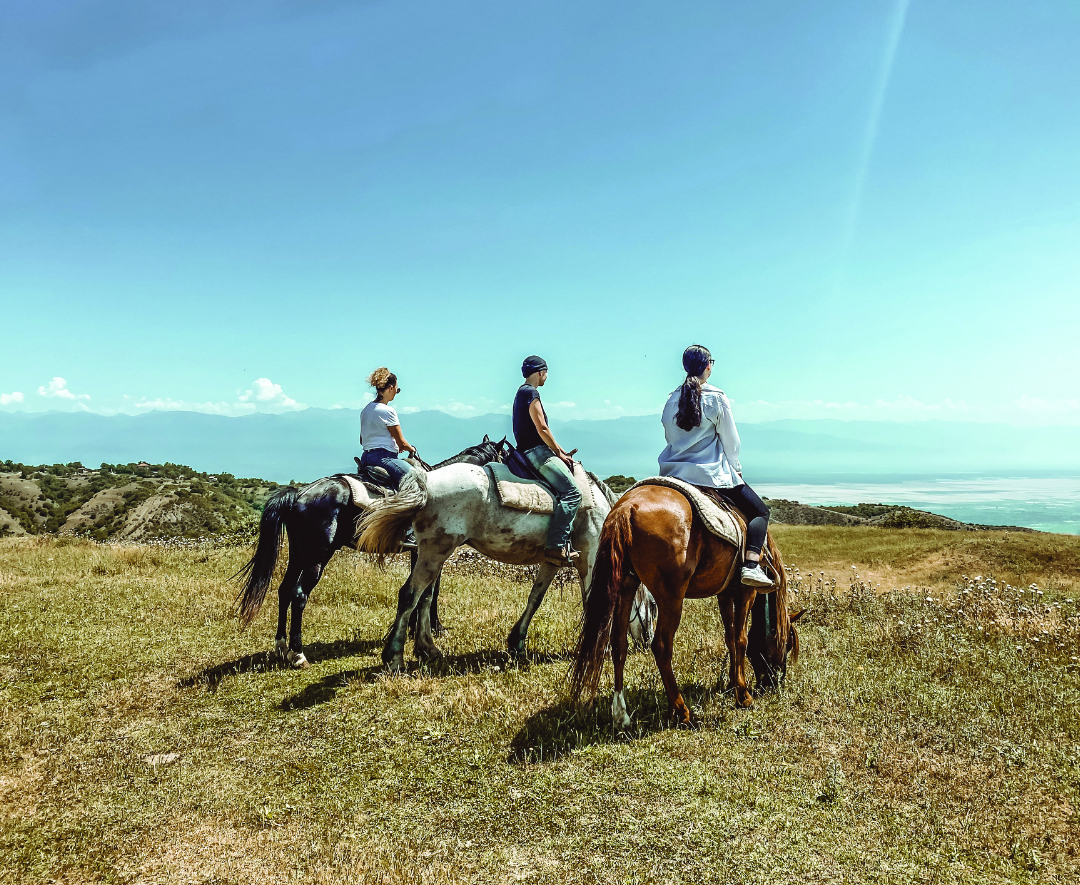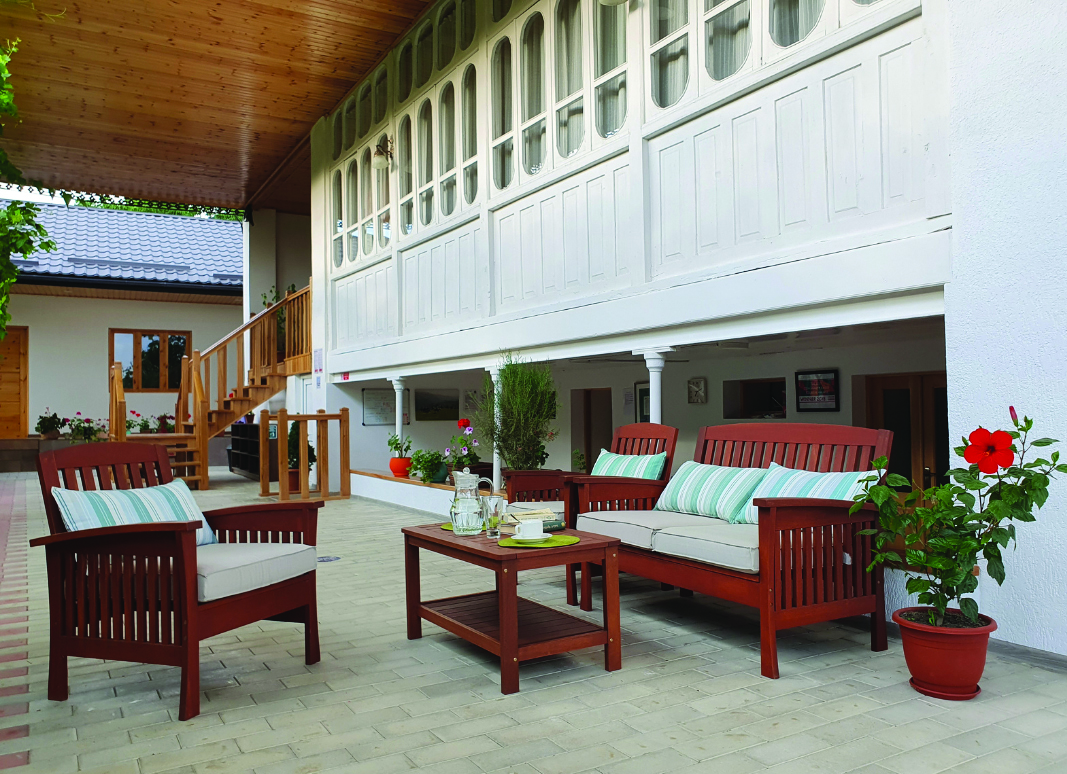New web-portal GoCaucasus.today is the perfect place for those seeking to enjoy and support green tourism destinations, sustainable rural, adventure tourism activities and ecotourism, and the promotion of green businesses.
The website was set up within the project Digital Caucasus, implemented by CENN via a grant awarded by the USAID Bureau for Europe and Eurasia, Economic Development, Governance and Enterprise Growth project, and aims not only to support travelers like us, but also to promote the best Georgia, Armenia and Azerbaijan have to offer.
With 31.8% of the region covered in protected areas, and 27 national parks, there is plenty of green to explore here.
The website guides visitors through the activities available and green sights to see, from zip-lining, paragliding, rock-climbing, rafting and birdwatching, to hot-air ballooning, bungee-jumping, skiing, cycling, hiking and fishing- whatever floats your boat, you’ll be sure to find it here. You’ll also find a comprehensive guide to the region’s national parks of various environmental value well-worth visiting, and responsible tour operators to guide you on the way.
Let’s imagine you’re a hiking enthusiast. Click on the relevant photo and you’ll be given the option of which country you want to hike in- Georgia, Armenia or Azerbaijan. On choosing your country, you’ll be offered a number of enticing locations to check out, and directed to other online sources for further information and tours.
Now let’s say you want to see your chosen Caucasus country from the air, from a hot-air balloon to be exact. Click on the photo and your country, and you’ll be given links to the tours available.
And that’s not all! More fun awaits visitors to the GoCaucasus.today site in a link to the Map of Biodiversity in the South Caucasus. The National Geographic Magazine-Georgia map incorporates 120 illustrations and basic biodiversity information on species found in the South Caucasus (mostly Georgia) on an electronic version of the map.

“Have you ever squeezed the honey from the honeycomb while bees float around you? Do you know the taste of newly-made cheese?” the GoCaucasus.today site asks. Rural life in the Caucasus is rich and promising and, like the activities function, the sustainable business section is also a delight for those exploring the Caucasus. The honey-making, cheese-making and wine-making sections offer detailed but easy-to-read information about the history behind each craft in each country, and provides links to further reading to help you on your journey of discovery.
And to help you on that journey are links to tour operators, restaurants, guest houses, wine cellars, craftsmen, guides, and transport services in the three countries. In short, there is no better place to find everything you need to explore the Caucasus region safely, greenly, with respect to nature, and guaranteed to come away with unforgettable experiences,
knowing you have supported local sustainable and eco-friendly businesses.
The portal features SMEs from the South Caucasus countries and links to their online booking platforms and websites so their services can be booked easily. If nothing else, the Covid-19 pandemic has shown us how vital it is for businesses to be presented professionally in the digital world.
David Lelashvili, Regional Representative, USAID Project for Economic Development, Governance, and Enterprise Growth in Europe and Eurasia (EDGE), told us why is it important to develop the digital skills of small and medium-sized enterprises in tourism, and what role the EDGE project plays in achieving this goal.
“USAID EDGE is a regional activity in Europe and Eurasia (E&E) that aims to create inclusive, sustainable economic growth and to support intra-regional and Euro-Atlantic integration. EDGE is managed by the E&E Bureau in Washington and works closely with USAID Missions and projects in the region. USAID EDGE covers the following countries: Albania, Armenia, Azerbaijan, Belarus, Bosnia-Herzegovina, Georgia, Moldova, Montenegro, North Macedonia, Kosovo, Serbia, and Ukraine.
“As a result of the Covid pandemic and various restrictions to contain the virus, domestic and international economic activities, as well as the purchasing power of the customers in Georgia and other EDGE countries, have significantly decreased. In this context, micro, small and medium-size businesses in the tourism field suffered greatly, and there is a need to explore new, innovative ways to aid business survival and competitiveness. To that end, EDGE plans to capitalize on the massive acceleration of global e-commerce and promote digital skills development and promotion among tourism field SMEs in the region as a way to allow the businesses to bounce back and increase sales significantly. E-commerce holds a tremendous potential for the survival of MSMEs in the tourism field by means of attracting customers from local and international markets. Improved digital skills can assist SMEs to better organize everyday business activities also by streaming and simplifying business processes,” David tells us.
“EDGE has several projects to assist touristic SMEs in the South Caucasus countries to develop digital skills and use digital solutions to increase sales in the context of the Covid pandemic. With EDGE financing, two tourism web portals will be created for touristic stakeholders in Caucasus countries. One of them is the GoCaucasus.today web portal.”
We next asked David how he sees the GoCaucasus portal helping tourism businesses in Georgia, Armenia and Azerbaijan.
“The GoCaucasus portal contains comprehensive information about tourism opportunities in South Caucasus countries (including info on touristic destinations, touristic routes, as well as already mentioned touristic company profiles with the suggested touristic services). The web portal should assist attracting international and regional (from Georgia, Armenia and Azerbaijan) tourists to those destinations, and enhancing cooperation among tourism stakeholders of the South Caucasus countries. International tourists will be encouraged to extend their trips with three-country tourism opportunities- visiting several countries, intra country touristic trails, thematic intra country tours, etc.,” David concludes.

We spoke to Nazy Dakishvili, Owner of Nazy’s Guest House, to get the business perspective on the new portal.
“Nazy’s Guest House is hosted on different platforms including its own website, Booking.com, Airbnb.com, Tripadvisor.com, Facebook, Instagram and now GoCaucasus. We estimate that 95% of our bookings come through these online platforms and 5% through email,” she tells us.
“When I started the Nazy’s Guest House tourism business in 2013, I was aware of the importance of having a professional virtual presence on digit channels, through which people can see and interact with me virtually from anywhere in the world. The core of my business strategy is therefore geared towards online digital marketing and communication because the majority of tourists use digital internet-based technologies like smart phones, tablet devices and laptops to search holiday destinations and make bookings,” Nazy says.
“I realised that to succeed in promoting my business globally and connecting with the broadest customer base possible, I needed to harness the power of digital technology and create a distinct channel. Therefore, my first step was to create and host the nazysguesthouse.com website in 2013. The website instantly generated interest on its launch, and I started to receive bookings from customers from around the world through this channel.
“My next step was to diversify the presence and promotion of my business across the most popular global digital channels, so I launched it on Facebook.com, Booking.com, Airbnb.com, Tripadvisor.com, as well as on a number of other platforms. This increased the number of bookings very significantly, and they remain the key portals through which customers find out about us, communicate with us and make bookings.
“I believe that for any tourism business to succeed, they need to fundamentally direct their efforts towards professionally advertising and promoting their services and brand to a wide audience using online digital channels, and to use these channels to connect with people effectively. As most people have access to and use a variety of digital platforms, particularly social media, it makes the process of communication between business and customer much easier and quicker. These channels are the main driver of business for Nazy’s Guest House.
“The popularity and achievements of Nazy’s Guest House are attributed to the diversity of digital channels it is hosted on and the consistency of professional content it presents. Each channel allows for tourists to find us and connect with us easily. The positive comments, recommendations and ratings uploaded by our customers about our services on Booking.com, Tripadvisor.com, Airbnb.com, etc, has helped establish the reputation and image of Nazy’s Guest House as a professional quality tourism enterprise in Georgia and internationally thanks to the power of online digital resources,” Nazy notes.
“GoCaucasus is the first tourism destination portal covering the Caucasus region, which serves as a single-entry point and provides its visitors with comprehensive information about unique green tourism opportunities in the region,” says Ana Petriashvili, Digital Caucasus Project National Coordinator. “The GoCaucasus portal features unique experiences in adventure, eco and rural tourism in Georgia, Armenia and Azerbaijan. The portal contains links to all relevant internet and other types of tourist resources, which allows the information posted on the portal to be up-to-date and easily accessible to its visitors. The GoCaucasus portal is optimized for search engines, so the tourism businesses featured on the website to be best positioned on the internet. As a result, providers of tourist services across the Caucasus are promoted and available on the international tourism market.”
By Katie Ruth Davies
